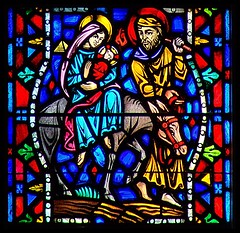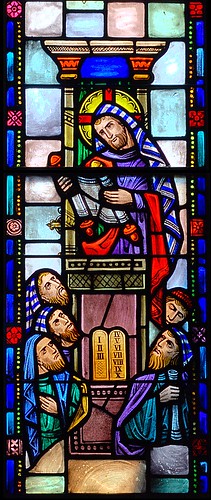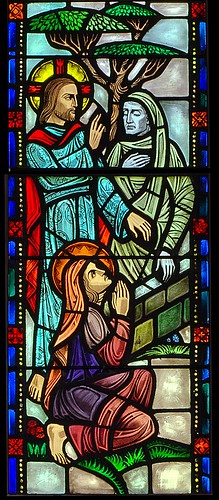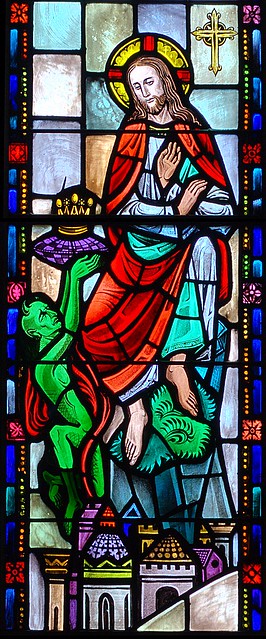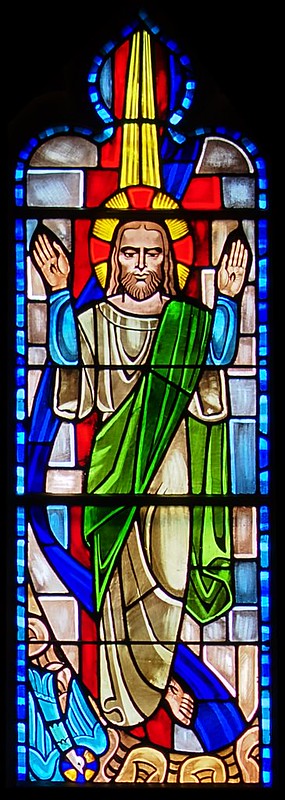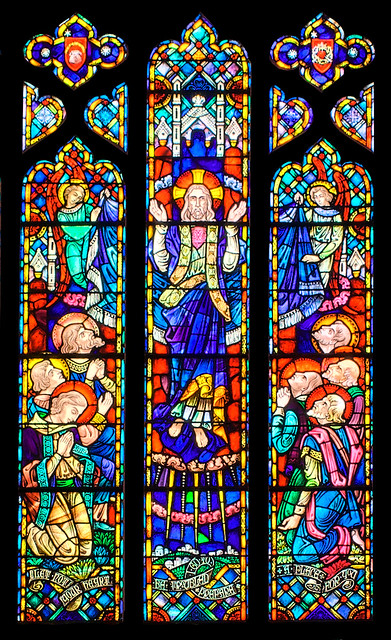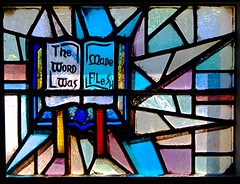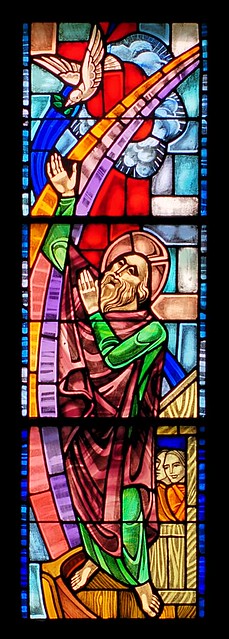 |
| God destroyed the world with a flood in anger over their sin and violence, but He spared Noah’s family. |
After a murderous gunman killed 26 people in a Texas church in 2017, and wounded all of the survivors in attempting to kill them, he was described as having “a lot of hatred inside him.” Such is the result of holding on to anger so that it is no surprise that the ancient Church listed anger or wrath as one of the seven deadly sins. The consequences of untamed anger are violence, murder, and war. There are clearly terrible things which result from anger, yet if we look at what Holy Scripture says about anger we might be surprised to find that anger is not always sinful.
Saint Paul writes in Ephesians 4:26-27, “In your anger do not sin: Do not let the sun go down while you are still angry, and do not give the devil a foothold.” Because the Apostle encourages Christians not to sin in their anger, it follows that there can be anger without sin. We call that righteous anger. Righteous anger is anger over things that are wrong or evil. We should be angry when people sin against our neighbors and treat others in an unrighteous manner. God, Himself gets angry over sin because He didn’t create us to sin, but to be holy. We, however, have corrupted what God made holy, and have turned to sin. In the New International Version of the Bible a quick word search finds 256 occurrences of the word “anger” and 190 occurrences of the word “wrath”. Many of these are describing the anger and wrath of God. Yet God does not sin in His anger and wrath, even when He takes it out on those who sin against Him, or other people. God is righteous in His anger because He is holy, and because He loves us and doesn’t want us to do evil. He may let us see that there are wicked consequences to sin, but He does this to show us that we need His forgiveness and redemption through Jesus Christ.
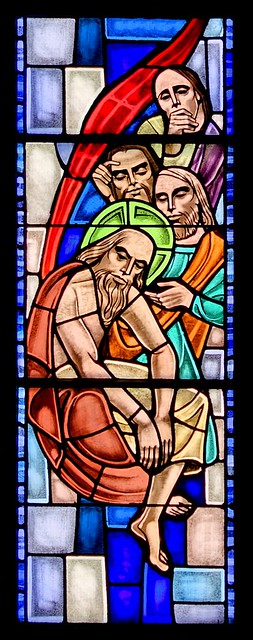 |
| Contrary to what Job’s friends thought God was not punishing Job but testing His faith to strengthen it. |
Yet, even though there is such a thing as righteous anger, it doesn’t mean there is no such thing as unrighteous anger. Jesus Himself teaches in Matthew 5:21-22, “You have heard that it was said to the people long ago, ‘Do not murder, and anyone who murders will be subject to judgment.’ But I tell you that anyone who is angry with his brother will be subject to judgment. Again, anyone who says to his brother, ‘Raca,’ is answerable to the Sanhedrin. But anyone who says, ‘You fool!’ will be in danger of the fire of hell.” We sinners are much more likely to sin in our anger than Jesus or His heavenly Father. So we ought to be careful in how we act according to our anger.
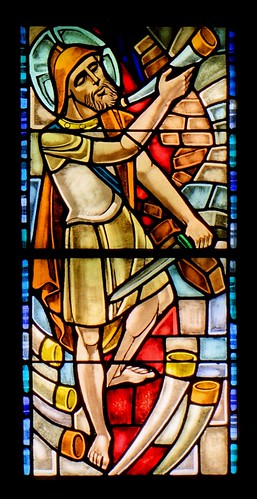 |
| God gives authority to governments to punish wrongdoers as Joshua did in Jericho. |
Now, just because there is righteous anger, and even a righteous use of violence to punish wrongdoers, this doesn’t give us the excuse to exercise our anger in all cases, even when we can be justified in acting out in anger. Saint Paul counsels in Romans 12:17-21 “Do not repay anyone evil for evil. Be careful to do what is right in the eyes of everybody. If it is possible, as far as it depends on you, live at peace with everyone. Do not take revenge, my friends, but leave room for God’s wrath, for it is written: ‘It is mine to avenge; I will repay,’ says the Lord. On the contrary: ‘If your enemy is hungry, feed him; if he is thirsty, give him something to drink. In doing this, you will heap burning coals on his head.’ Do not be overcome by evil, but overcome evil with good.” This is what Jesus did at all times, and in doing so He won our salvation. Because God is righteous and holy, He is always right when He acts according to His anger and wrath.
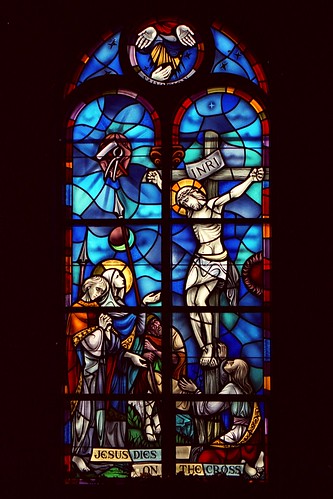 |
| Jesus did not act in anger when he was wrongly accused and forgave his murderers on the cross. |
Because Jesus has overcome sin and death through His sinless life, and His innocent suffering and death in payment for our sins, all those who were wrongly murdered will live again, and those who murder will also live again. Jesus has destroyed the power of death. All who trust in Jesus for the forgiveness of their sins have been forgiven and will live in paradise as God’s beloved children. This includes some people who were guilty of murder in life, but who repented of those sins and trusted in Jesus to forgive them. On the other hand, those who reject Christ’s forgiveness will suffer God’s wrath for eternity because although Jesus paid for their sins and gives them life and salvation as a free gift, they reject the gift and place themselves under God’s righteous wrath. This may include both unbelieving murderers, and the otherwise innocent people they kill. In such a case the tragedy is compounded.
 |
| When Jesus returns in glory He will bring salvation to all believers and judgment for all who hate Him. |
Here is a small selection of Bible verses about anger.
Psalm 6:1
O Lord, rebuke me not in your anger, nor discipline me in your wrath.
Psalm 7:6
Arise, O Lord, in your anger; lift yourself up against the fury of my enemies; awake for me; you have appointed a judgment.
Proverbs 29:8
Scoffers set a city aflame, but the wise turn away wrath.
James 1:19-20
Know this, my beloved brothers: let every person be quick to hear, slow to speak, slow to anger; for the anger of man does not produce the righteousness of God.
Colossians 3:5-10
Put to death, therefore, whatever belongs to your earthly nature: sexual immorality, impurity, lust, evil desires and greed, which is idolatry. Because of these, the wrath of God is coming. You used to walk in these ways, in the life you once lived. But now you must rid yourselves of all such things as these: anger, rage, malice, slander, and filthy language from your lips. Do not lie to each other, since you have taken off your old self with its practices and have put on the new self, which is being renewed in knowledge in the image of its Creator.



